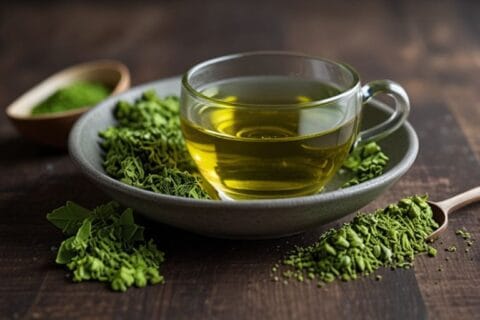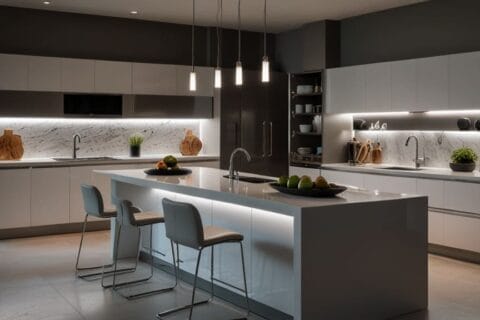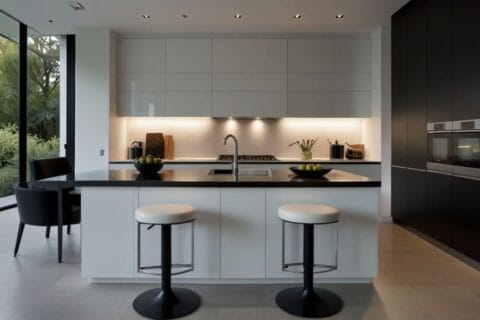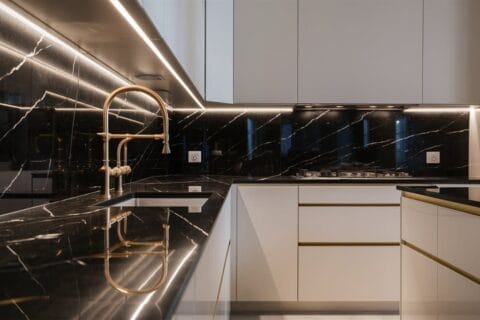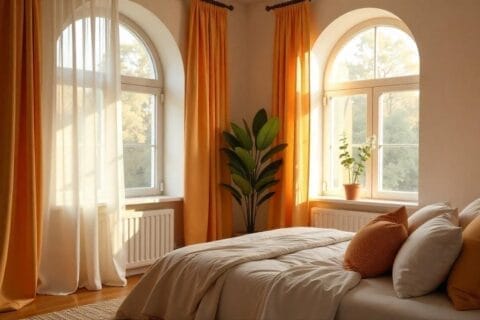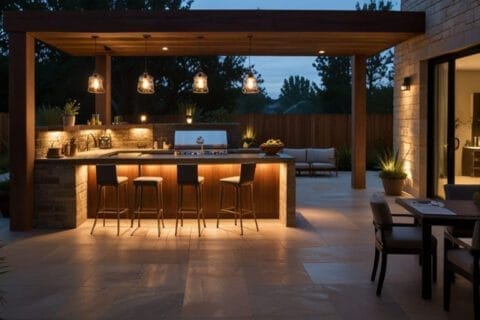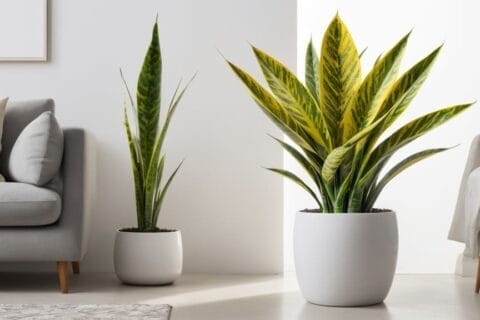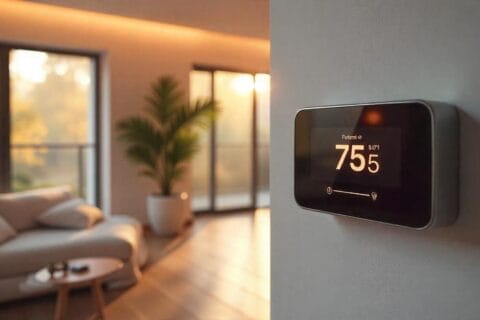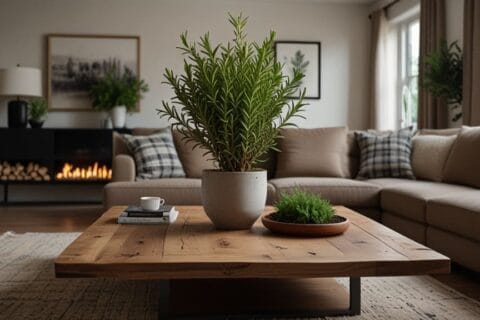Outdoor kitchens have become increasingly popular as homeowners seek to extend their living space into the great outdoors. These spaces provide an opportunity to cook, entertain, and relax all while enjoying the fresh air and beautiful scenery. One of the most critical aspects of setting up an outdoor kitchen is selecting the right countertop material. The best material for outdoor kitchen countertops is essential not only for aesthetics but also for durability, maintenance, and functionality. In this comprehensive guide, we will explore the top countertop materials for outdoor kitchens, discuss their pros and cons, and provide insights on how to choose the right one for your needs.
Introduction to Outdoor Kitchen Countertops
Outdoor kitchen countertops serve as the primary work surface where food is prepared, cooked, and served. They must withstand various weather conditions, from intense sunlight to rain, and even occasional freezing temperatures. Choosing the best material for outdoor kitchen countertops is crucial to ensure that they remain functional and visually appealing over time. The right material will resist damage from UV rays, moisture, and extreme temperatures while enhancing the outdoor space’s visual harmony.
Why Choose the Right Material
Selecting the appropriate material directly impacts the durability, maintenance, aesthetic appeal, and overall usability of the outdoor kitchen. The right material will resist damage from UV rays, moisture, and extreme temperatures while enhancing the outdoor space’s visual harmony. 24 Genius Small Kitchen Design Ideas with Island to Maximize Space and Style
Types of Outdoor Kitchen Countertop Materials
Granite
Advantages of Granite Countertops
- Durability: Granite stands out for its exceptional strength and long-lasting durability. It can withstand high heat, scratches, and stains, making it an excellent choice for busy outdoor kitchens. This natural stone is also resistant to UV radiation, which prevents fading and ensures that the countertops maintain their vibrant color over time.
- Aesthetics: Granite countertops come in a wide range of colors and patterns, allowing you to match them with your outdoor decor and other elements. The natural veining and unique patterns of granite can add a touch of elegance to any outdoor kitchen.
- Maintenance: While granite requires sealing to protect against stains, it is relatively low-maintenance. Sealing should be done periodically to maintain its durability and appearance. Regular cleaning with mild soap and water is sufficient for routine maintenance.
Drawbacks of Granite Countertops
- Cost: Granite countertops can be relatively high in price, especially considering their professional installation requirements.
- Weight: Due to its density, granite can be heavy, requiring robust cabinetry to support it properly.
Marble
Benefits of Marble Countertops
- Aesthetic Appeal: Marble countertops offer a timeless, classic look that is hard to match. They add a sense of luxury and sophistication to any outdoor kitchen with their smooth, polished surface and subtle color variations.
- Heat Resistance: Marble can withstand high temperatures, making it suitable for areas near grills and other cooking appliances.
- It develops a distinctive patina over time, adding to its vintage appeal.
Challenges of Marble Countertops
- Maintenance: Marble is more susceptible to scratching and staining than granite due to its porous nature. It requires regular sealing and a little more care to prevent damage from acidic substances like lemon juice or vinegar.
- Cost: Like granite, marble countertops can be expensive, and installation costs are also on the higher side.
Quartz
Reasons to Choose Quartz Countertops
- Non-Porous Nature: Quartz countertops are non-porous, which means they are resistant to bacteria, stains, and spills. This makes them ideal for outdoor kitchens where hygiene is a priority.
- Variety of Colors: Quartz countertops come in a wide array of colors and patterns, allowing you to create a personalized look that matches your outdoor space perfectly.
- Low Maintenance: They require minimal maintenance; cleaning with a mild soap and water solution is typically enough to keep them looking new.
Disadvantages of Quartz Countertops
- Heat Resistance: While they can withstand moderate heat, they are not as heat-resistant as natural stones like granite or marble. Caution should be taken to prevent exposure to hot pans.
- Cost: Quartz countertops tend to be on the more expensive side due to the manufacturing process and materials used.
Concrete
Pros of Concrete Countertops
- Customization: Concrete countertops offer unparalleled design flexibility. They can be customized to fit any shape, size, or color, making them a great choice for unique outdoor kitchen designs.
- Strength: Concrete is extremely durable and can support heavy loads without cracking.
- Weather Resistance: Properly sealed concrete countertops are highly resistant to weather elements, including rain, UV rays, and freezing temperatures. Best Countertop Color for White Cabinets: A Complete Guide to Choosing the Perfect Match
Cons of Concrete Countertops
- Maintenance: Concrete countertops require sealing to protect them from stains and scratches. Over time, they may develop minor cracks or chips, which can be repaired with appropriate sealers.
- Weight: Like granite, concrete can be heavy, requiring strong cabinetry and proper installation.
Soapstone
Advantages of Soapstone Countertops
- Heat Resistance: Soapstone can withstand extremely high temperatures, making it perfect for grilling stations and near heat sources.
- Scratch and Stain Resistance: This natural stone is non-porous, which means it is resistant to stains and scratches, requiring minimal maintenance.
- Aesthetic Appeal: Soapstone countertops have a beautiful, matte finish that develops a unique patina over time, enhancing their rustic charm.
Disadvantages of Soapstone Countertops
- Cost: Soapstone is more expensive than other countertop options. Its installation also requires skilled craftsmanship.
- Maintenance: Although low-maintenance, soapstone requires occasional oiling to maintain its luster and prevent it from drying out.
Tile
Benefits of Tile Countertops
- Variety of Colors and Patterns: Tile countertops offer an extensive range of design possibilities. Whether you prefer bright, bold colors or subtle earth tones, there is a tile to match your style.
- Affordability: Tiles are generally more budget-friendly than other materials.
- Ease of Repair: If a tile gets damaged, it can be easily replaced without affecting the entire countertop.
Drawbacks of Tile Countertops
- Grout Maintenance: The grout between tiles can stain and requires regular cleaning and sealing.
- Durability: Tiles can crack or chip under heavy use or impact.
Stainless Steel

Why Choose Stainless Steel Countertops
- Durability: Stainless steel is incredibly durable and resistant to heat, stains, and rust, making it ideal for outdoor kitchens.
- Hygiene: The smooth, non-porous surface of stainless steel makes it easy to clean and maintain, which is crucial for hygiene in an outdoor setting.
- Aesthetic Appeal: Stainless steel has a modern, industrial look that complements contemporary outdoor kitchen designs.
Cons of Stainless Steel Countertops
- Cost: Stainless steel is one of the more expensive countertop options.
- Maintenance: Although it’s low-maintenance, stainless steel can show scratches and fingerprints over time.
Wood
Advantages of Wood Countertops
- Natural Beauty: Wood countertops bring warmth and a natural, earthy feel to outdoor kitchens.
- Durability: With proper sealing and maintenance, wood countertops can withstand outdoor conditions well.
- Customization: They can be sanded and refinished to restore their original look.
Challenges with Wood Countertops
- Maintenance: Wood requires regular oiling to protect against moisture and UV damage.
- Sensitivity to Moisture: Wood can warp or swell when exposed to excessive moisture.
Factors to Consider
Climate and Weather Conditions
- Temperature Extremes: Discuss how extreme heat and cold can affect countertop materials. For example, granite and concrete can handle high temperatures well, but marble and wood may not.
- UV Exposure: Explain how UV rays can cause fading and deterioration in some materials. Materials like granite, quartz, and stainless steel are generally more resistant to UV damage.
How to Select a Material Based on Climate
- Hot Climates: Stainless steel, concrete, and granite are excellent choices as they can withstand high heat without fading or warping.
- Cold Climates: Granite and marble are more suitable in cooler climates as they can endure freezing temperatures without cracking.
Budget and Cost
- Granite: Expensive but durable.
- Marble: High cost with elegant aesthetics.
- Quartz: Mid-range in terms of cost.
- Concrete: Customizable but costly.
- Soapstone: Higher end in price.
- Tile: Budget-friendly option.
- Stainless Steel: Expensive but modern and durable.
- Wood: Mid-range but requires maintenance.
How Budget Influences Material Selection
- Discuss how the trade-offs between cost and quality affect the choice of countertop materials. For instance, while granite offers durability, its higher price might not be justifiable for everyone. Also Read Black Marble Countertop Kitchen ideas: Style Your Kitchen for a Luxurious Look
Maintenance Requirements
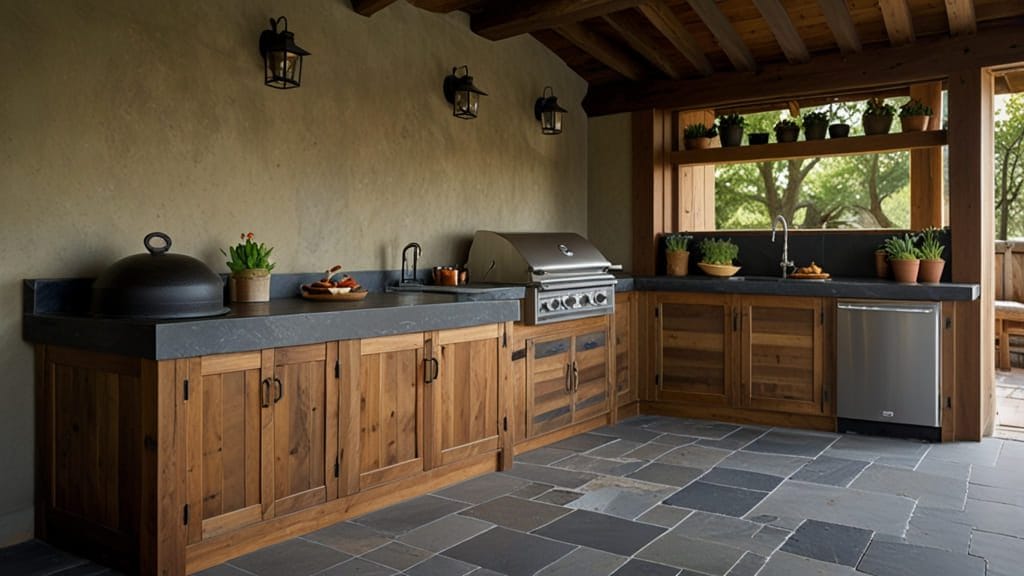

- Granite: Requires periodic sealing to prevent stains.
- Marble: Demands regular sealing and gentle cleaning.
- Quartz: Minimal maintenance required.
- Concrete: Needs sealing and occasional repairs.
- Soapstone: Easy to maintain but needs occasional oiling.
- Tile: Requires grout cleaning and sealing.
- Stainless Steel: Low-maintenance but can show scratches.
- Wood: Requires regular oiling and sealing.
Aesthetic Preferences
Choosing the Right Material Based on Style
- Granite: Versatile, fits traditional and modern designs.
- Marble: Luxurious, fits classic designs.
- Quartz: Modern and versatile.
- Concrete: Customizable, great for unique designs.
- Soapstone: Rustic charm.
- Tile: Flexible, can match various design themes.
- Stainless Steel: Industrial, fits contemporary designs.
- Wood: Warm, suits rustic or traditional outdoor kitchens.
Installation Considerations
Professional Installation
- Granite: Requires professional installation due to its weight and precision cutting.
- Marble: Professional installation is essential.
- Quartz: Can be easier to install compared to granite or marble.
- Concrete: Requires skilled craftsmen to avoid cracking.
- Soapstone: Professional installation recommended.
- Tile: Easier to install with DIY options available.
- Stainless Steel: Can be a straightforward installation process.
- Wood: Requires proper sealing and professional installation to ensure durability.
Maintenance Tips
- Cleaning: Discuss basic cleaning methods for each material.
- Sealing: Importance of sealing countertops to protect them from stains, moisture, and UV damage.
- Preventative Maintenance: Tips to keep countertops looking new, such as using cutting boards to avoid scratches and avoiding exposure to excessive moisture.
Outdoor kitchen countertops play a critical role in enhancing the functionality and aesthetics of outdoor cooking areas. The best material for outdoor kitchen countertops will depend on various factors such as budget, climate, maintenance preferences, and aesthetic style. By understanding the pros and cons of each material and considering these factors, you can make an informed decision that will serve you well for years to come.
FAQs
Which is the most durable material for outdoor kitchen countertops?
The most durable materials for outdoor kitchen countertops are granite, concrete, and stainless steel. These options can withstand extreme temperatures, UV rays, and heavy use without significant wear or fading over time.
Are granite countertops a good choice for outdoor kitchens?
Yes, granite countertops are an excellent choice for outdoor kitchens due to their high durability, heat resistance, and wide range of colors and patterns. They can withstand exposure to the elements and are relatively low-maintenance with proper sealing.
How do I maintain marble countertops in an outdoor kitchen?
Marble countertops require regular sealing to prevent stains and protect against weather elements. They should be cleaned gently with a soft cloth and mild soap, and acidic substances should be avoided to maintain their finish.
What are the pros and cons of using concrete for outdoor kitchen countertops?
Concrete countertops offer strength, customization, and weather resistance. However, they require regular sealing to prevent staining and minor maintenance for any cracks or chips. They can also be on the more expensive side.
Is stainless steel a good option for outdoor kitchen countertops?
Yes, stainless steel is a great option for outdoor kitchens due to its durability, resistance to heat and stains, and easy maintenance. It’s particularly suitable for contemporary and industrial designs but can show scratches over time.


